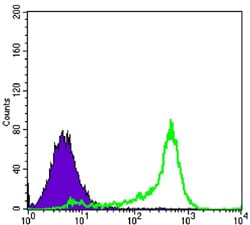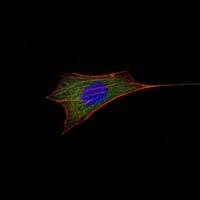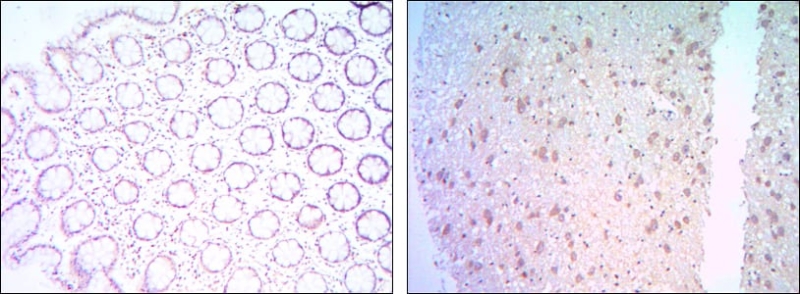


| WB | 咨询技术 | Human,Mouse,Rat |
| IF | 咨询技术 | Human,Mouse,Rat |
| IHC | 1/200 - 1/1000 | Human,Mouse,Rat |
| ICC | 1/200 - 1/1000 | Human,Mouse,Rat |
| FCM | 1/200 - 1/400 | Human,Mouse,Rat |
| Elisa | 1/10000 | Human,Mouse,Rat |
| Aliases | Bcl-2; BCL2 |
| Entrez GeneID | 596 |
| clone | 8E12 |
| WB Predicted band size | 26kDa |
| Host/Isotype | Mouse IgG1 |
| Antibody Type | Primary antibody |
| Storage | Store at 4°C short term. Aliquot and store at -20°C long term. Avoid freeze/thaw cycles. |
| Species Reactivity | Human,Mouse |
| Immunogen | Synthetic peptide corresponding to residues surrounding BCL-2, conjugated to KLH. |
| Formulation | Ascitic fluid containing 0.03% sodium azide. |
+ +
以下是3-4条关于BCL-2抗体的参考文献及其简要摘要:
---
1. **文献名称**:*Cloning of the chromosome breakpoint of neoplastic B cells with the t(14;18) chromosome translocation*
**作者**:Tsujimoto, Y., & Croce, C. M.
**摘要**:该研究首次克隆了BCL-2基因,发现其在B细胞淋巴瘤中因染色体易位(t(14;18))异常高表达,揭示了BCL-2在肿瘤发生中的作用,并推动了相关抗体的开发用于检测BCL-2蛋白表达。
---
2. **文献名称**:*BCL-2 gene promotes haemopoietic cell survival and cooperates with c-myc to immortalize pre-B cells*
**作者**:Vaux, D. L., et al.
**摘要**:通过基因转染实验证明BCL-2蛋白能够抑制细胞凋亡,延长细胞存活,并与c-myc协同促进肿瘤发生。研究中使用特异性抗体验证了BCL-2在细胞内的定位和功能。
---
3. **文献名称**:*BCL-2 expression in solid tumors: Prognostic implications and therapeutic targeting*
**作者**:Robertson, L. E., et al.
**摘要**:通过免疫组化分析多种实体瘤中BCL-2的表达水平,发现其高表达与化疗耐药性相关。该研究为BCL-2抗体的临床应用(如预后标志物检测)提供了依据。
---
4. **文献名称**:*ABT-199. a potent and selective BCL-2 inhibitor, achieves antitumor activity while sparing platelets*
**作者**:Souers, A. J., et al.
**摘要**:报道了选择性BCL-2抑制剂Venetoclax(ABT-199)的研发,通过靶向BCL-2蛋白诱导癌细胞凋亡。研究中利用BCL-2抗体验证药物靶点结合效率及疗效评估。
---
**说明**:以上文献涵盖了BCL-2的基因发现、功能机制、临床相关性及靶向治疗,其中抗体技术被广泛用于蛋白表达检测、功能验证及药物开发评估。
BCL-2 antibodies are essential tools for studying the B-cell lymphoma 2 (BCL-2) protein, a critical regulator of apoptosis. Discovered in 1985 through chromosomal translocation studies in B-cell lymphomas, BCL-2 is an anti-apoptotic protein that prevents mitochondrial outer membrane permeabilization, thereby inhibiting programmed cell death. Dysregulation of BCL-2. often due to overexpression, is implicated in cancer development, autoimmune disorders, and resistance to chemotherapy.
BCL-2 antibodies, including monoclonal and polyclonal variants, are widely used in research and diagnostics to detect protein expression levels via techniques like Western blotting, immunohistochemistry (IHC), and flow cytometry. They help identify BCL-2 overexpression in malignancies such as follicular lymphoma, chronic lymphocytic leukemia (CLL), and some solid tumors, aiding in disease classification and prognosis.
Therapeutically, BCL-2 has become a drug target. Venetoclax, a BCL-2 inhibitor, exploits the interaction between BCL-2 and pro-apoptotic proteins to restore apoptosis in cancer cells. Antibodies also support mechanistic studies of such drugs and resistance mechanisms. However, challenges persist, including off-target effects in therapies and the need for precise biomarker-driven applications. Research continues to refine antibody specificity and explore combination therapies to overcome resistance. Overall, BCL-2 antibodies remain pivotal in understanding apoptosis regulation and advancing targeted cancer treatments.
×